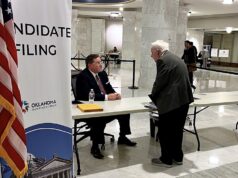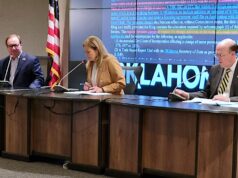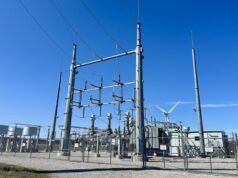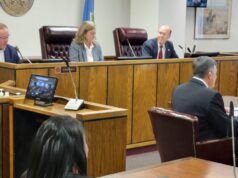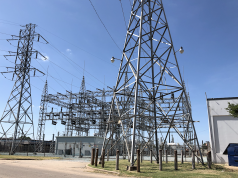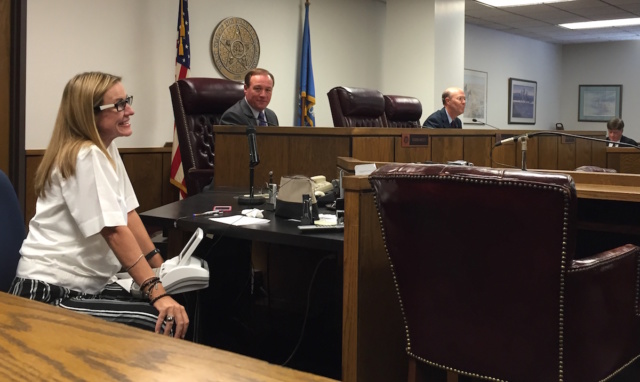

Only two of Oklahoma’s three Corporation Commission members attended today’s meeting on a potentially enormous challenge of a 29-year-old telecommunications rate increase, but Commissioner Todd Hiett managed to move the issue toward a resolution anyway.
Previously undecided, Hiett announced he would oppose the application for a hearing on PUD 260, which centers on a Southwestern Bell rate increase from 1987 that passed with the vote of a commissioner who was later convicted of accepting bribes on it and other matters.
But with Commissioner Dana Murphy missing from the meeting, Hiett argued that the commission should not hear testimony from the numerous attorneys and parties present for the case. Instead, Hiett and Commissioner Bob Anthony — who supports the application and has been intricately involved with the bribery case since its origin — voted to delay a hearing in front of an administrative law judge until 8:30 a.m. Thursday, Sept. 8. The other PUD 260 matters were simply delayed.
‘Departure from normal procedure’
As the meeting started, staff provided media with an unusual statement from Murphy that subtly criticized Anthony:
“I am sorry I am unable to attend today’s hearing. As my fellow Commissioners know, I stated two weeks ago that I could not approve of the August 22 hearing date because of a potential scheduling conflict. I was therefore surprised to find that at the direction of Chairman Anthony, my signature stamp had been affixed to the notice setting today’s date. I addressed this matter in our public meeting August 16, and I thank Chairman Anthony for his attention to the issues raised by this departure from normal procedure.”
In reality, Hiett’s announcement on whether he supported hearing the petition for $16 billion of ratepayer rebates was the swing vote that attorneys, media and the public had been waiting months to hear.
“I do not agree in total with (Southwestern) Bell’s position, with Bell’s logic in terms with discussing the case. I do not agree in total with the AG’s position,” Hiett said. “But I have come to my own conclusion in terms of the case being dismissed.”
Anthony asked Hiett whether his decision was “a matter of law or a matter of policy?”
Hiett replied, “A matter of law.”
Anthony continued with critiques of Southwestern Bell’s opposition to the application, though Hiett’s statement of position had taken the air out of the room. Russ Walker, an attorney for the applicants, requested a 10-minute recess for all attorneys involved to convene in light of Hiett’s decision. That’s when all parties agreed to postpone a formal conclusion to the matter further down the road so Murphy could be present.
“I don’t plan to go into the merits of the case today,” Hiett said.
Anthony concluded his extensive remarks on the topic by noting that bureaucrats made a statement on the matter in late 1996, meaning that a 20-year anniversary of waiting on the outcome is approaching quickly.
“In other words, government has labored greatly and didn’t even produce a stone,” Anthony said.
After the meeting, Hiett said researching 30 years worth of law, rulings and documents complicated his decision and the entire process. But he said the time frame ultimately is irrelevant.
“It wouldn’t matter if it was three months or 30 years,” he said. “The facts are the facts.”









